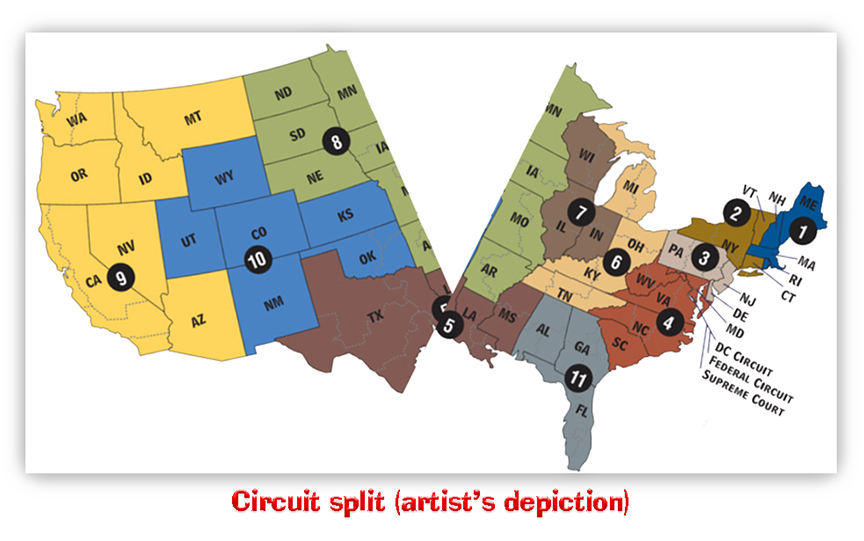We post news and comment on federal criminal justice issues, focused primarily on trial and post-conviction matters, legislative initiatives, and sentencing issues.

10TH CIRCUIT SAYS FELON-IN-POSSESSION BAN IS CONSTITUTIONAL
The Supreme Court’s 2022 decision in New York State Rifle & Pistol Association v. Bruen has spawned a tsunami of 2nd Amendment attacks on 18 USC § 922(g), the subsection of the law that prohibits various classes of people (and we’re including you, drug-using Hunter Biden) from possessing guns or ammo.
 Most notably, the 3rd Circuit ruled in Range v. Attorney General, an en banc decision last June, that the § 922(g)(1) felon-in-possession ban is unconstitutional as it applies to people convicted of nonviolent felonies (again – if the tax stuff goes badly for you – Hunter Biden, we’d be talking about you again).
Most notably, the 3rd Circuit ruled in Range v. Attorney General, an en banc decision last June, that the § 922(g)(1) felon-in-possession ban is unconstitutional as it applies to people convicted of nonviolent felonies (again – if the tax stuff goes badly for you – Hunter Biden, we’d be talking about you again).
Other subsections of § 922(g) are faring no better. A month ago, the 5th Circuit held in United States v. Daniels that § 922(g)(3)‘s ban on drug abusers possessing guns was unconstitutional. That Circuit’s United States v. Rahimi decision had already held that someone subject to a civil protection order could not be prohibited from possessing a gun. The Supreme Court has granted certiorari in that case.
 Range conflicts with United States v. Jackson, an 8th Circuit ruling from a week before Range was issued that holds that § 922(g)(1)‘s felon-in-possession ban remained a lawful limitation on gun possession even after Bruen. Last week, in Vincent v. Garland, a case with facts a lot those in like Range, the 10th Circuit agreed with Jackson’s reasoning. The odds of a showdown at the Supreme Court – perhaps a sweeping decision that is the firearms equivalent of the evisceration of Roe v. Wade – are increasing.
Range conflicts with United States v. Jackson, an 8th Circuit ruling from a week before Range was issued that holds that § 922(g)(1)‘s felon-in-possession ban remained a lawful limitation on gun possession even after Bruen. Last week, in Vincent v. Garland, a case with facts a lot those in like Range, the 10th Circuit agreed with Jackson’s reasoning. The odds of a showdown at the Supreme Court – perhaps a sweeping decision that is the firearms equivalent of the evisceration of Roe v. Wade – are increasing.
 Melynda Vincent, addicted to meth at the time, was convicted of bank fraud 15 years ago. Now, with time served and her drug problems behind her, Melinda wants to own a gun again. She argued that the 10th Circuit’s 2009 precedent, United States v. McCane – that held § 922(g)(1) to be constitutional – was no longer good law after Bruen.
Melynda Vincent, addicted to meth at the time, was convicted of bank fraud 15 years ago. Now, with time served and her drug problems behind her, Melinda wants to own a gun again. She argued that the 10th Circuit’s 2009 precedent, United States v. McCane – that held § 922(g)(1) to be constitutional – was no longer good law after Bruen.
The 10th rejected her argument. The appellate court noted that McCane relied “solely” on District of Columbia v. Heller, a 2008 case in which the Supreme Court appeared to recognize that § 922(g)(1) was constitutional.
Though Bruen created a new test for determining the scope of the 2nd Amendment,” the 10th observed, “the Supreme Court didn’t appear to question the constitutionality of longstanding prohibitions on possession of firearms by convicted felons… First, six of the nine Bruen Justices pointed out that they were not casting any doubt on the [felon prohibition] language in Heller. Second, Bruen apparently approved the constitutionality of regulations requiring criminal background checks before applicants could get gun permits. In Bruen, the Court struck down state regulations that had required the showing of a special need before someone could get a license to carry a gun. But the Court added that it wasn’t questioning the constitutionality of “shall-issue” licensing regimes. These regimes don’t require a showing of special need, but they do ‘often require applicants to undergo a background check’ to ensure that the applicant is a ‘law-abiding, responsible citizen.’
The Circuit said that in preserving “shall-issue” background checks, the Supremes “arguably implied that it was constitutional to deny firearm licenses to individuals with felony convictions. Bruen’s language thus could support an inference that the 2nd Amendment doesn’t entitle felons to possess firearms.”
 The government is planning to take Range to the Supreme Court by an October 5th deadline. This 10th Circuit holding that “Bruen did not indisputably and pellucidly abrogate our precedential opinion in McCane” makes the circuit split more pronounced than before, making a grant of certiorari on Range likelier than ever.
The government is planning to take Range to the Supreme Court by an October 5th deadline. This 10th Circuit holding that “Bruen did not indisputably and pellucidly abrogate our precedential opinion in McCane” makes the circuit split more pronounced than before, making a grant of certiorari on Range likelier than ever.
Vincent v. Garland, Case No 21-4121, 2023 USApp LEXIS 24554 (10th Cir. Sep. 15, 2023)
New York State Rifle & Pistol Association v. Bruen, 597 U.S. —, 142 S. Ct. 2111, 213 L. Ed. 2d 387 (June 23, 2022)
United States v. McCane, 573 F.3d 1037 (10th Cir. 2009)
Range v. Attorney General, 69 F.4th 96 (3d Cir. 2023)
United States v. Jackson, 69 F.4th 495 (8th Cir. 2023)
District of Columbia v. Heller, 554 US 570 (2008)
– Thomas L. Root

